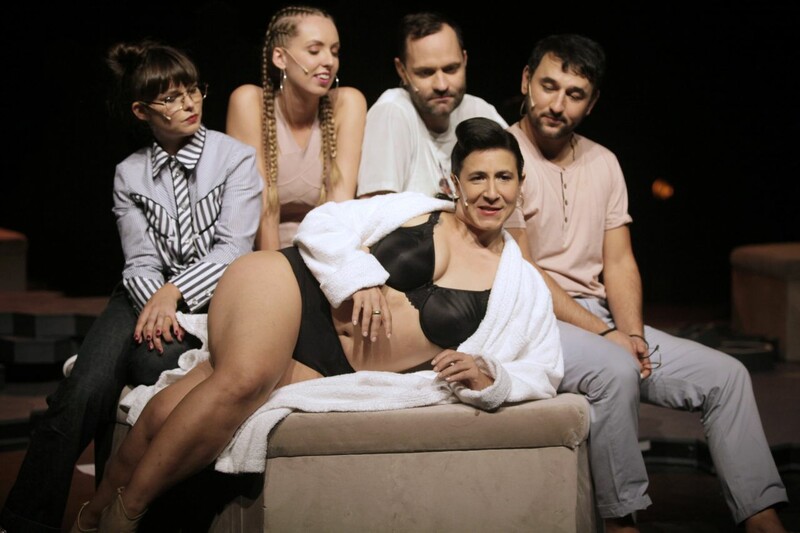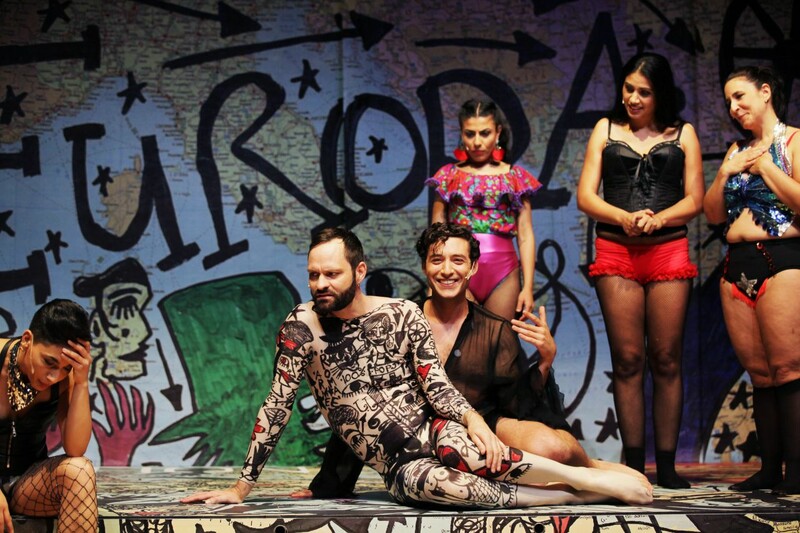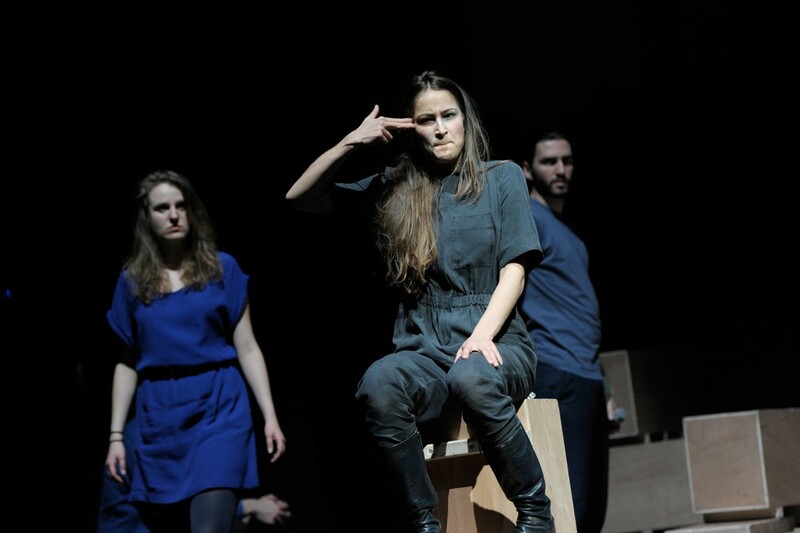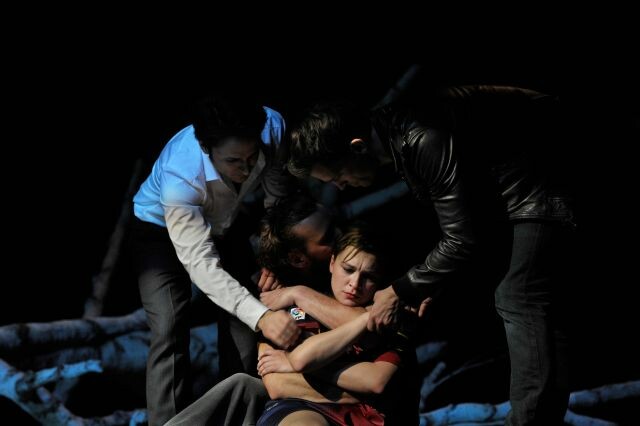Yael Ronen
Works
Play, 2019
For her new project, Yael Ronen and the ensemble set off on a historical and artistic research project on the history of »witches« and their persecution in Europe. The phenomena of witch hunts reached its peak in Germany in the early modern period between the Reformation and wars of religion that followed and didn’t conclude until around 1800. More than half of all female victims around the world were burned in German cities and villages. Tens of thousands of women lost their lives. The Bible verse »Thou shalt not suffer a witch to live.« (Exodus, 22, 17) had transformed itself into an instrument for the general persecution and disciplining of women. At that time of capitalism’s beginnings, the modern patriarchy was coming into being, and it has proven itself to be surprisingly difficult to stamp out. Does the character of the witch serve as the justification for a powerful image that continued to devalue the female in the religious as well as the economic world over the following centuries?
Ronen and ensemble look behind the traditional image for a potential practice of resistance, or even utopia, for overcoming the patriarchy and its images of women and men. With the tools of the theater she researches how this story is written into the bodies of women and how these bodies can free themselves from an experience of oppression. What knowledge, what practices were lost during the persecution of »witches«, who might have been healers and advisors, especially for the poor? Which performative rituals have survived in contemporary shamanism beyond male monotheism and could inspire an art that dreams of freeing all bodies – female and male and everything in between? And how can theater, through its rituals and stories, act on and talk about this?
The project is gearing up and working on a prompt destruction of the patriarchy. The Witches are coming back!

Theaterstück, 2019
In their new devised play Yes but No, Yael Ronen and her intrepid ensemble take the aftermath of #MeToo personally. They face themselves as victims and as perpetrators, discuss attacks, sexual abuse, explore desires and boundaries, get to the bottom of their own fears and mindfucks, and search for sincere communication in private parts.
The most important thing is to be honest, right? Surely we can talk openly about everything? Or can’t we? But one should know exactly where the line between honesty and harassment lies, what’s appropriate, what one’s allowed to say and what not. Above all, one should know how to find out about all that.
Where fantasy and reality, state of emergency and everyday life, desire and fear of casualties meet, language reaches its limits and it becomes difficult to »talk about it«. And when someone does speak, then it’s often as a catcall on the street, as a comment at work, always following the lines of the patriarchy from top to bottom. But how does the treatment of shame, fear and lust change offline in times of #MeToo’s online revolution? And although the theatre loves conflicts and encourages an analysis of societal structures, the ensemble dares to attempt something unusual: visions. They set out to put new forms of cooperation to the test – with the audience as well. And where language fails, music begins, with songs specially composed by Israeli superstar and relationship expert Shlomi Shaban.
Trigger warning: This play discusses amongst other things abuse and sexualized violence.

Theaterstück, 2017
»The community of European peoples went to pieces when – and because – it allowed its weakest member to be excluded and persecuted.« Hannah Arendt
At a time when Europe is at risk of drifting into neo-fascism, a group of actors is calling for a Roma army for the purpose of self-defence. A rapid intervention force to fight structural discrimination, racism and antiziganism, but also as emancipation from an internalized role of victims. The actors are Romnija, Roma and Romani travellers from Austria, Serbia, Germany, Kosovo, Romania, England and Sweden. They are also Israeli-German-Turkish-Berlin Gadjé – that means that the Roma Army is supranational, diverse, feminist, queer. Initiated by the sisters Simonida and Sandra Selimović, they are entering the stage at the Gorki in a collective act of selfempowering artistic action with resident director Yael Ronen: through a joint research process, personal experiences, historical contaminations and contemporary incidents are explored and used to develop a play. Together with visual artists Delaine and Damian Le Bas from England, they sketch out a vision for a Safe European Home in Gypsyland Europe, as the Le Bas call it.

Play, 2014
Yugoslavia – a country that no longer exists. Perished in wars between brothers in the 90s. For the second time since 1914, Sarajevo was at the center of a seemingly never-ending conflict that lives on in the present. Many people fled to Berlin – on the run, in search of work, of another life. How do these Berliners experience these conflicts today? Here the children of the victims of war crimes live alongside the children of the perpetrators. How do they interact?
Common ground is the substance we share, a foundation on which to stand. In her new project Yael Ronen brings together performers who came to Berlin from Belgrade and Sarajevo, Novi Sad and Prijedor. What is their Common Ground? The play will be developed collectively based on a trip to Bosnia, and on encounters with experts and the family members of the protagonists. The theater becomes a safe space for discussing terms like guilt and atonement, forgiveness and forgetting, while stereotypes, prejudices and conflicting narratives gleefully collide.
Common Ground is sponsored by the Capital Cultural Fund Berlin.
Photo: Ute Langkafel

Play, 2013
Masha is German, Jewish, Azerbaijani and, when necessary, Russian or Turkish. She is fluent in five languages, and speaks a few more much “like the Ballermann tourists speak German”. Masha's boyfriend Elias struggles with the mystery surrounding her childhood in Baku. She doesn't want to talk about it, and he refuses to let it go. But Masha hates discussions about her “immigrant background” and terms like “post-migrant” – especially when they're used by her boyfriend from provincial eastern Germany. There's still Sami, who doesn't need words to understand, but he's on another continent. When Masha suddenly loses Elias, her world shatters. In a mad rush, she travels to Israel and searches the desert for a new life, a new love, a new beginning.
Fractures and fresh starts run through the protagonists' lives in Der Russe ist einer, der Birken liebt (All Russians Love Birch Trees). Their family histories are moulded by the fragility of the world: by collapsing private, political and social systems.
With English surtitles
Premiere: 16. November 2013
Yael Ronen was born in Jerusalem in 1976 and lives in Tel Aviv and Berlin. Her productions Common Ground and The Situation were both invited to the Berlin Theatertreffen (2015 and 2016). In addition to Gorki, where she is an in-house director, she also works at the Münchener Kammerspiele and the Volkstheater in Vienna. Her work was previously shown at the 1., 2. and 3. Berliner Herbstsalon (2013, 2017).
